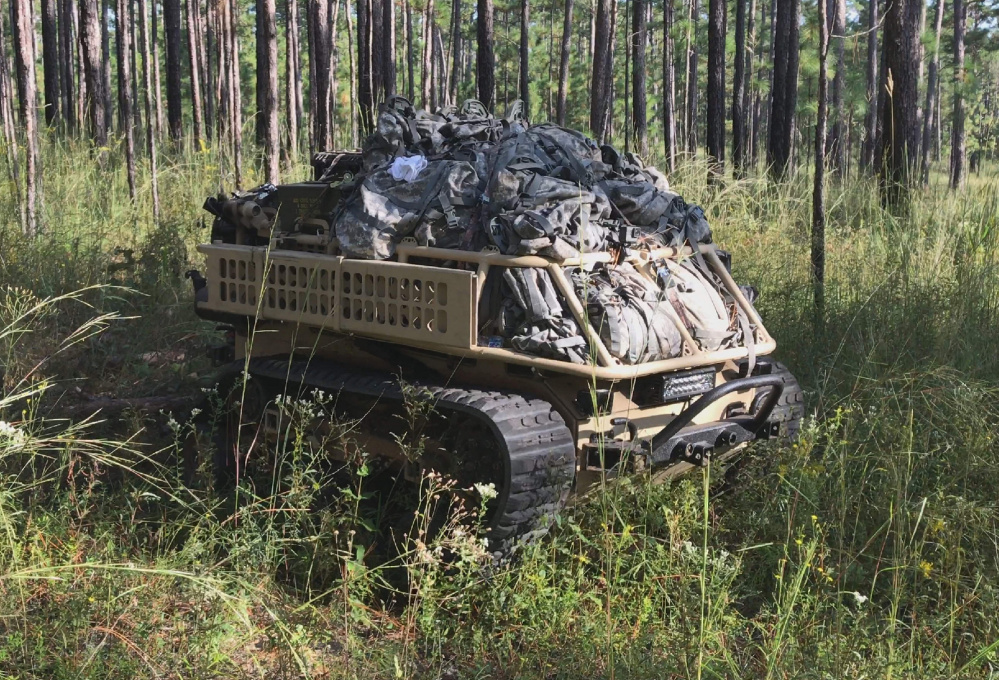A Maine robotics company is in the running to build the Army’s next generation of battlefield support vehicles.
Waterboro-based Howe and Howe Technologies is competing with three other firms for a massive government contract to build autonomous vehicles that will carry ammunition and supplies into combat with Army ground forces.
“It is going to be a huge thing in the future, as big as drones or Humvees,” said Michael Howe, who owns the company with his twin, Geoffrey. The Army is expected to order thousands of the units by 2020.
“We are sitting on the precipice of a massive contract,” he said. “If we can win the final bid, it will be a billion-dollar contract.”
To get to this point, Howe and Howe had to pass a grueling field test of their vehicle in the thick swamps and forests of Fort Benning, Georgia. The RS2-H1, a midsized unmanned vehicle, is under consideration for the Army’s Squad Multipurpose Equipment Transport program, aimed at “enhancing soldier lethality and reducing logistical burdens,” said Lt. Col. Cory Berg, product manager for large unmanned ground systems with the Army. That means saving soldiers’ lives and moving equipment quickly.

The tracked vehicle, powered with a diesel-electric hybrid motor and carrying 1,000 pounds in its top cargo cage, completed a 60-mile field test in 29 hours – less than half the time allotted during trials held in September and October. Howe was right alongside the machine, wading through streams and thick underbrush, dodging poisonous snakes and forcing himself into a pace that averaged 2 mph.
“We walked every single mile of that and we did it in 29 hours. It was the hardest thing I’ve ever done,” Howe said.
The outcome, however, was worth it. Howe and Howe passed the trials, beating major defense companies like Lockheed Martin and AM General, which builds the Humvee, and moving onto the next phase of product development.
It will now get a contract to build 20 robots that will be safety-tested at the Army’s proving grounds in Aberdeen, Maryland. Howe declined to disclose the exact value of the contract, except that it is in the “millions” of dollars. After safety tests, two finalists will be field-tested for a year by Army units.
Based on the results of the field test, the Army plans to award a multi-year contract in 2019, Berg said.

The other companies moving onto the next development phase are General Dynamics Land Systems, HDT Global and a combined effort from Applied Research Associates and Polaris Defense.
The robot designed by Howe’s company has some unique features, such as modular armor plating, a universal generator that can charge batteries used in soldiers’ equipment, and a front-mounted tool that can trigger roadside bombs while keeping soldiers safe. The robot was built on the basis of a platform designed to deal with IEDs, or improvised explosive devices, that Howe and Howe Technologies has been developing for seven years, Howe said.
Although the company has invested hundreds of thousands of dollars into the project, it isn’t betting everything on the RS2-H1. When defense funding was slashed during budget reductions, the so-called sequestration in 2013, Howe and Howe took a big financial hit and had to lay off many of its workers. Since then, the company has moved into the civilian market, building firefighting robots, luxury supertanks and vehicles for Hollywood blockbusters. Howe and Howe now employs between 30 and 50 people, depending on its workload.
“This will not be a make-or-break for us,” Howe said. “Sequestration really hurt us, (but) we were able to diversify really well.”
Peter McGuire can be contacted at 791-6325 or at:
pmcguire@pressherald.com
Twitter: PeteL_McGuire

Comments are no longer available on this story